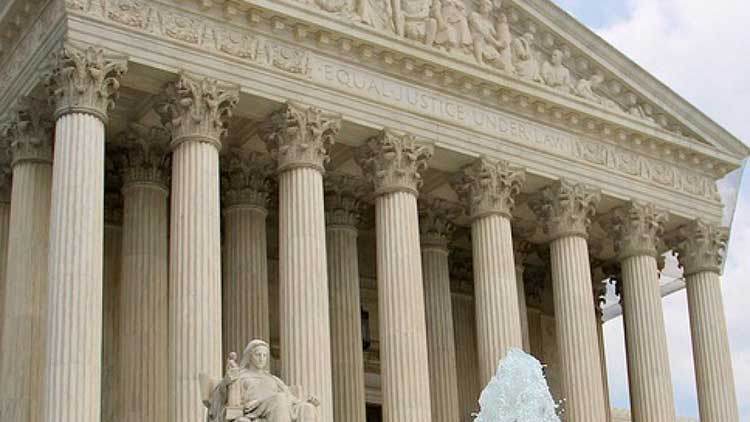Supremes Allow States to Tax Online Retailers

The smarter way to stay on top of broadcasting and cable industry. Sign up below
You are now subscribed
Your newsletter sign-up was successful
The Supreme Court has opened the door for states to require online retailers without a physical presence in the state to collect and remit taxes on sales to consumers within that state.
That came in a 5-4 decision in South Dakota v. Wayfair Inc. that reversed earlier Supreme Court precedent.
The High Court ruled that the reigning precedent (in Quill Corp. v. North Dakota, in particular) that a physical presence was required was "unsound and incorrect," and the Justices overturned a South Dakota State Supreme Court ruling that Quill was the controlling precedent and a South Dakota tax on online retailers with sales over $100,000 was unconstitutional.
Related: New York Scraps Online Sales Tax Proposal
"The Commerce Clause must not prefer interstate commerce only to the point where a merchant physically crosses state borders," the court ruled. "Rejecting the physical presence rule is necessary to ensure that artificial competitive advantages are not created by this Court’s precedents."
Chief Justice John Roberts was actually in the minority, and wrote the dissenting opinion joined by more liberal justices Stephen Breyer, Elena Kagan and Sonia Sotomayor.
Justice Anthony Kennedy wrote the opinion for the majority, joined by Clarence Thomas, Ruth Bader Ginsburg, Samuel Alito and Neil Gorsuch.
The smarter way to stay on top of broadcasting and cable industry. Sign up below
Pointing to online retailing, the majority said: "When the day-to-day functions of marketing and distribution in the modern economy are considered, it becomes evident that Quill’s physical presence rule is artificial, not just 'at its edges' but in its entirety. Modern e-commerce does not align analytically with a test that relies on the sort of physical presence defined in Quill. And the Court should not maintain a rule that ignores substantial virtual connections to the State."
The court suggested that arguing for the South Dakota tax not being an undue burden on commerce included that there is a safe harbor for those who transact less than $100,000 worth of business in the state, and the fact that the tax can't be applied retroactively.
States have been looking for ways to boost their coffers in tough economic times, including by taxing online retail sales in their states. The ruling also saw the physical presence requirement as a an "extraordinary imposition" on the Judiciary's and state's authority to collect taxes that support critical functions.
"By giving some online retailers an arbitrary advantage over their competitors who collect state sales taxes, Quill’s physical presence rule has limited States’ ability to seek long-term prosperity and has prevented market participants from competing on an even playing field."
In the dissent, Roberts said the decision on allowing those taxes was best left to Congress, which has yet to weigh in, though there have been legislative efforts to pass a bill allowing such state taxes.
"A good reason to leave these matters to Congress is that legislators may more directly consider the competing interests at stake," Roberts wrote. "Unlike this Court, Congress has the flexibility to address these questions in a wide variety of ways.
"The Court is of course correct that the Nation’s economy has changed dramatically since the time that Bellas Hess [a related precedential opinion also overturned] and Quill roamed the earth," he added. But since the Constitution gave Congress the power to regulate commerce among the states, "I would let Congress decide whether to depart from the physical-presence rule that has governed this area for half a century."
One member of Congress had already decided.
Rep. Suzan DelBene (D-Wash.) made the following statement shortly after the Supreme Court ruled in favor of allowing states to collect sales taxes on online purchases in South Dakota v. Wayfair, Inc.: “I am very pleased with the Supreme Court’s decision to abandon the outdated physical presence rule set by Quill, As in so many other areas, technology has evolved faster than the law and left us with at times bizarre, unfair results. This is a big win for local brick-and-mortar retailers, who will now get a chance to compete on a level playing field with out-of-state internet companies that have maintained an unfair edge by not collecting sales taxes. This decision will also help bring back millions of dollars in revenue for Washington state and communities across the country while allowing small businesses to expand and thrive.”
Democrats in Congress had tried without success to pass a national version of the tax, the Marketplace Fairness Act, that would allow states to collect taxes on goods and services purchased by their citizens without regard to where the seller of the goods was based.
One of the Democrats pushing hardest for such a law has been Senate Democratic Whip Dick Durbin (D-Ill.). “This is good news for main street businesses in Illinois and across America," he said. "This ruling clears the way for our retailers to compete on a level playing field with internet giants. I’m honored to be part of the bipartisan coalition in Congress that has worked for years to make this change."
He said his state could collect more than $380 million in new revenues thanks to the decision.
Contributing editor John Eggerton has been an editor and/or writer on media regulation, legislation and policy for over four decades, including covering the FCC, FTC, Congress, the major media trade associations, and the federal courts. In addition to Multichannel News and Broadcasting + Cable, his work has appeared in Radio World, TV Technology, TV Fax, This Week in Consumer Electronics, Variety and the Encyclopedia Britannica.

